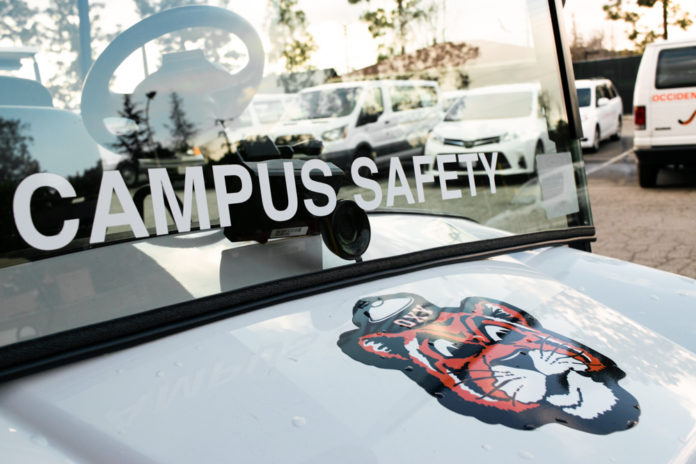
At least two dorm security incidents have taken place during the 2018–2019 academic year, according to Campus Safety. Two students reported separate incidents of an individual taking photos of other students in a Haines Hall shower Oct. 4 and Nov. 2. As a result, keycard systems have been installed on all Haines restrooms to limit restroom access to hall residents.
The most recent dorm security incident involved a report of an unidentified male washing clothes in the second-floor restroom of Newcomb Hall Feb. 7, according to Rick Tanksley, director of Campus Safety. Tanksley alerted residents of the incident in a campus-wide email sent Feb. 8. A Newcomb resident later claimed the unidentified male as their guest in an anonymous letter posted in Newcomb shortly after the email.
In his Feb. 8 email, Tanksley described the second-floor restroom as being designated for women. According to Associate Director of Housing Services Monique Hankerson, all Newcomb restrooms are currently gender-neutral, and resident adviser (RA) McKenna Sims said the second-floor restroom was gender-neutral at the time of the incident. Graduate Hall Coordinator Ashley Cooper confirmed in a Feb. 22 email to Newcomb residents that all of the hall’s restrooms have been gender-neutral all year and will remain so for the rest of the year. According to Newcomb resident Lia Kane (sophomore), the second-floor restroom was not labeled with signage designating it as gender-neutral until after the Feb. 7 incident.
“These two incidents are especially concerning to us,” Tanksley said. “It’s tricky because you don’t want to make the mistake of confronting someone who has a lawful right to be here, who was invited by someone, but you do have a right, because it is your residence, to ask. We try to take a measured approach and not overreact in a way that could further complicate things.”
Elena Kervitsky (junior) is currently an RA in Steward-Cleland (Stewie) Hall. While the incidents this year have been concerning, they are not uncommon on campus, according to Kervitsky.
“Every year there’s been a different kind of security issue,” Kervitsky said. “In terms of what’s been happening, it’s not really any different, but there have been changes put in place.”
Layal Bata (sophomore) is an RA in Haines Hall. According to Bata, Haines has implemented a keycard lock on their bathroom facilities and installed extra curtains in the shower areas.
“It’s kinda eerie that we have to do it in the first place,” Bata said. “Every time I put my key in that door, I’m reminded about why we have to do that. At the same time, it’s a necessary precaution.”
Residents have expressed that they feel safer with the new security measures, according to Bata.
“That idea came from our students at a community meeting,” Bata said. “It was community-driven. I think people understand that it’s a safety measure. There’s Oxy Confessions about how they’re annoying, and they are, but at the same time, I’ve talked to a lot of residents and they feel a lot more comfortable using the showers now.”
Residential Education & Housing Services did not give any direct instructions to the Haines RAs about how to manage the security incidents, Bata said.
According to Tanksley, Campus Safety is planning to introduce a smartphone app to campus. This will allow students to contact or make reports to Campus Safety and other college departments directly from their phone. Campus Safety also plans to create two new positions by hiring an assistant director of Campus Safety and administrative assistant, Tanksley said.
“By adding the additional position of assistant director, it frees me up for more strategic planning for the department as well as being able to get out on campus and meet people more, developing ways in which we can further collaborate with students and staff to become one with the community,” Tanksley said. “That way we aren’t just seen as ‘Campus Safety,’ but you know me by name. That’s the kind of feeling I want to try and develop here.”
Similarly, Occidental maintains its collaborative relationship with the surrounding neighborhoods of Eagle Rock and Highland Park through the school’s open–campus policy.
“The College has a longstanding policy of being open to our neighbors and the public,” Tanksley said via email. “We are not just in the community, we are a part of the community. Those who pose a threat or risk to the safety and security of the Oxy community or college property will be advised to leave. As many people are unaware of our policies, rules and regulations, it is the responsibility of Campus Safety to educate them and allow folks the opportunity to comply.”
Tanksley said one of his main priorities is establishing a stronger connection between Campus Safety and the rest of Occidental’s community. Since Campus Safety does not patrol residence halls and only enters halls when called for assistance or during a fire alarm, they rely on a collaborative relationship with students and staff.
“Safety and security is a community-wide responsibility, looking out for one another,” Tanksley said. “The Campus Safety Advisory Committee is one avenue from which I can receive ideas from students and staff on how to improve Campus Safety services.”
Tanksley added that Campus Safety is always looking to give safety talks and provide residence halls with assistance in any way they can. Currently, Campus Safety operates with 15 officers, four cars, one truck, one Segway, one cart and three bicycles. In the past year, Campus Safety has also expanded officer training in de-escalation and crisis intervention, according to Tanksley.
Hankerson said major changes in security policy are unlikely anytime soon.
“To our knowledge there haven’t been any campus wide discussions on a campus wide security plan,” Hankerson said via email.
![]()






























